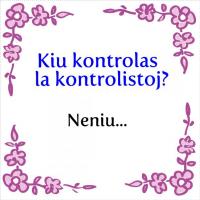讯息: 11
语言: English
mccambjd (显示个人资料) 2007年3月29日上午4:44:27
OK, but how does one pronounce those syllables?
I know "aŭ" is pronounced similarly to American English "ow", but how is "eŭ" pronounced, as in eŭropo and pseŭdonomo? And I can't even find any examples of "oŭ"...
edgarsitow (显示个人资料) 2007年3月29日上午6:00:35
 You live in the States so out of all the 29 million Mexican brothers I have over there you got to know some
You live in the States so out of all the 29 million Mexican brothers I have over there you got to know some  just ask them to tell you how to say "Europe" in Spanish and they will say "Europa" (same as one would say it in Esperanto but with an "o" instead of "a" obviously) and voilà!!
just ask them to tell you how to say "Europe" in Spanish and they will say "Europa" (same as one would say it in Esperanto but with an "o" instead of "a" obviously) and voilà!! I hope this was somewhat useful =]
Gxis
Edgar
RiotNrrd (显示个人资料) 2007年3月29日上午6:17:51
Kwekubo (显示个人资料) 2007年3月29日上午10:33:27
RiotNrrd:I believe that "eŭ" is pronounced like the word "pew", except without a "y" sound in there (and, of course, without the "p").The sound in "pew" would be better represented in Esperanto by "iu". If you can imagine Elmer Fudd saying, "Be vewwy quiet, I'm hunting wabbits," then eŭ would sound like the "eww" in "vewwy".
In practice oŭ is not used, other than perhaps if you were spelling a name out phonetically, or something similar - the distinction between it and o isn't really clear enough. The only word I can think of with oŭ in it is toŭfuo, a variant word for bean curd (aka tofu); the more usual name is sojkazeo (ie soj-kazeo), although I believe tohuo exists too.
erinja (显示个人资料) 2007年3月29日下午1:10:25
Kwekubo:I don't know anyone who says soj-kazeo; everyone I know says tofuo. Maybe it's a North American thing.
In practice oŭ is not used, other than perhaps if you were spelling a name out phonetically, or something similar - the distinction between it and o isn't really clear enough. The only word I can think of with oŭ in it is toŭfuo, a variant word for bean curd (aka tofu); the more usual name is sojkazeo (ie soj-kazeo), although I believe tohuo exists too.
I use oŭ all the time when I'm writing an imitation of a strong American accent. "Mij paroŭl's Esperaŭntoŭn!"
(British: Esperäntoŭn)
T0dd (显示个人资料) 2007年3月29日下午2:14:44
RiotNrrd:I believe that "eŭ" is pronounced like the word "pew", except without a "y" sound in there (and, of course, without the "p").Say "hey you", but drop the 'h' and fuse the two into one syllable.
erinja (显示个人资料) 2007年3月29日下午4:28:05
http://en.lernu.net/kursoj/ap/teksto.php?parto=2
RiotNrrd (显示个人资料) 2007年3月30日上午5:34:56
T0dd:Heh. Actually, that's how I say "pew", except without the "y" sound (and, of course, without the "p").RiotNrrd:I believe that "eŭ" is pronounced like the word "pew", except without a "y" sound in there (and, of course, without the "p").Say "hey you", but drop the 'h' and fuse the two into one syllable.
That's always the problem with describing pronunciations - if the person you're describing a word to by relating it to a different word doesn't know how YOU pronounce the different word first, it's not much of a help.
I remember asking how a particular esperanto sound was pronounced, on one of the eo mailing lists. Don Harlow replied to me with an example of an English word that contained the correct pronunciation, and since his hometown is about 15 minutes away from where I currently live I knew that he and I probably pronounce English with the same accent, and therefore I could trust his example. Someone from Australia started arguing with him on the list that he was TOTALLY wrong in his description of the sound.
And you know, the Australian was probably correct. The example was totally wrong... if one is speaking with an AUSTRALIAN ACCENT. Which neither Don nor I do. We're both Oregonians (although he doesn't live in Oregon any longer). So the example worked for me, but not for the other guy, even though we both (technically) speak English.
It's an easy trap to fall into. Really, the best way is to actually HEAR the sounds spoken, as written descriptions are basically a crapshoot. I speak with a west-coast, Oregon accent, so any examples I give are likely to be perfectly alright for another Oregonian, and completely wrong for someone from New York or Philadelphia (and especially Australia or Ireland). And vice versa.
russ (显示个人资料) 2008年11月17日上午9:48:50
"eŭ" should sound like Elmer Fudd's "vEWy cEWfuw" (very careful), that is, like an Esperanto "e" sound followed by an Esperanto "ŭ" (English "w") sound.
eijlander (显示个人资料) 2008年11月17日上午10:17:26
Ĝis,
Peter








